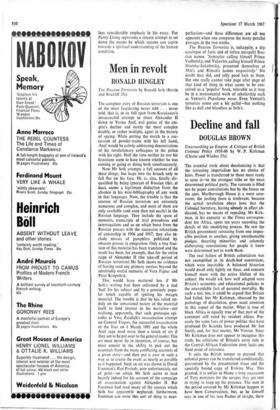Men in revolt
RONALD HINGLEY
The complete story of Russian terrorism is one of the most fascinating never told . . . never told, that is, in its full span from Karakazov's unsuccessful attempt to shoot Alexander II down to Yevno Azef, evil genius of the em- pire's decline and surely the most complex double, or rather multiple, agent in the history of spying. While putting the match to a suc- cession of powder-trains with his left hand, Azef would be calmly addressing denunciations of his revolutionary colleagues to the police with his right. Half the time neither he nor his historians seem to have known whether he was coming or going or doing both simultaneously.
Now Mr Seth attempts a full account of all these things; but leaps into the breach only to fall flat on his face. He is, alas, fatally dis- qualified by being ignorant of Russian (this, at least, seems a legitimate deduction from the absence in his mini-bibliography of any work in that language). Now, the trouble is that the sources of Russian terrorism are extremely numerous and complex, and most of them are only available (and even then not easily) in the Russian language. They include the spate of memoirs, transcripts of trial procedures and interrogations and so on which burst from the Russian presses with the successive relaxations of censorship in 1906 and 1917; they also in- clude masses of pamphlets published by obscure presses in emigration. Only a tiny frac- tion of this material has been translated and the result has been, for example, that for the entire reign of Alexander II (the take-off period of Russian terrorism) Mr Seth shows no evidence of having read any primary sources beyond the admittedly useful memoirs of Vera Figner and Peter Kropotkin.
This would have mattered less if Mr Seth's writing had been enlivened by a real 'feel' for his subject and by a genuinely popu- lar touch capable of igniting his meagre material. The trouble is that he has relied un- duly on the sensational nature of the material itself to lend interest to his narrative—not realising, apparently, that such grotesque epi- sodes as Vera Zasulich's assassination attempt on General Trepov, the successful assassination of the Tsar on 1 March 1881 and the whole Azef saga need more than a touch of art if they are to be put over to the general reader. This art must never lie in invention, of course, but must consist in the ability to pick out the essentials from the many conflicting accounts of a given story—and then put it over in such a way as to create the event as nearly as possible as it happened. Such an art was shown in David Footman's Red Prelude, now unfortunately out of print—on which Mr Seth seems to lean heavily indeed for his account of the campaign of assassination against Alexander II. But Footman had read many of the sources which Seth has apparently neglected; furthermore, Footman can write this sort of thing to near- perfection—and these differences are all too apparent when one compares the many parallel passages in the two works.
The Russian Terrorists is, unhappily, a dry catalogue of facts and of (often misspelt) Rus- sian names. `Samoylov calling himself Prince Vadbolsky, and Yakovlev,calling himself Prince Drutzky-Sokolensky, presented themselves at Min's and Riman's homes respectively.' No doubt they did, and jolly good luck to them. But one really cannot take page after page of that kind of thing in what seems to be con- ceived as a 'popular' book, tolerable as it may be in a monumental work of scholarship such as Venturi's Populismo russo. Even Venturi's terrorists come out a bit pallid—but nothing like as dull and bloodless as Seth's.






























 Previous page
Previous page